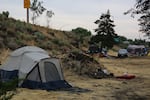The Bend City Council on Wednesday started the long process of creating new code to determine when, where and how unhoused people would be allowed to camp in the city.
While Wednesday’s meeting was just the first of a handful of work sessions, council members showed early disagreements on what a final draft might look like, all before an expectedly contentious public engagement process has begun.
Councilors discussed when and where unhoused people might be allowed to camp within city limits. At future meetings, they’re expected to discuss how people are allowed to camp and separate rules for those living in vehicles.

In this file photo, tents are seen along Colorado Avenue and U.S. Hwy 97 in Bend. The Bend City Council is workshopping a new ordinance to determine where camping in Bend will no longer be allowed.
Emily Cureton Cook / OPB
The effort to change city code stems from Martin v. Boise, a 2018 Ninth Circuit Court ruling that determined cities could not cite people for camping outside if no shelter space was available. Any citation would violate their Eighth Amendment rights.
A 2021 Oregon state law then codified the ruling, saying cities could establish “objectively reasonable” restrictions on camping on public property.
Those potential restrictions could be wide ranging. Bend assistant attorney Ian Leitheiser presented various restriction options to the council, including no camping in residential zones, near the Deschutes River, around public parks or schools, or certain public buildings.
All agreed that the code should prohibit camping in residential zones, while acknowledging that unhoused people generally don’t camp in those areas. Much of the current camping in the Bend area takes place near roadways and undeveloped land.
But councilors differed on restrictions around parks and schools. Councilor Megan Perkins said that buffers around those areas perpetuates a myth that unhoused people are inherently more dangerous.
Councilor Anthony Broadman said he wants to consider buffers around schools.
“I think it makes a ton of sense for public uses to be consistent with the use (they’re) intended for,” Broadman said.
Councilor Mo Mitchell said they wanted to make sure the focus was not just on where unhoused people could not go.
“What needs to be in there is where people can go,” Mitchell said. “Not this, ‘You can’t go here, you can’t go here, you can’t do this, you can’t do that.’”
Council members also agreed that while some city property would be unavailable for camping, Bend should reserve the right to open it up if need be.
City Manager Eric King said the city will hold public Q&A sessions further into the drafting process. Leitheiser told OPB he expects a draft of the ordinance to come before the council in September.
Homelessness and a shortage of available affordable housing have been on the rise across the region. Central Oregon had nearly 1,300 homeless adults and children in 2022, a 17% increase compared to last year, according to the most recent point in time count. Advocates have said point-in-time counts frequently undercount the actual figure.
The city has come under fire for sweeping encampments in the past. The most recent example came in March, when police closed a camp on Second Street after King declared it unsafe.
This summer, the council also passed a new shelter code that eases the process for private owners to open new shelters in the city as an effort to make more space available. According to city data, there are currently 12 shelters and safe parking sites located in Bend.

